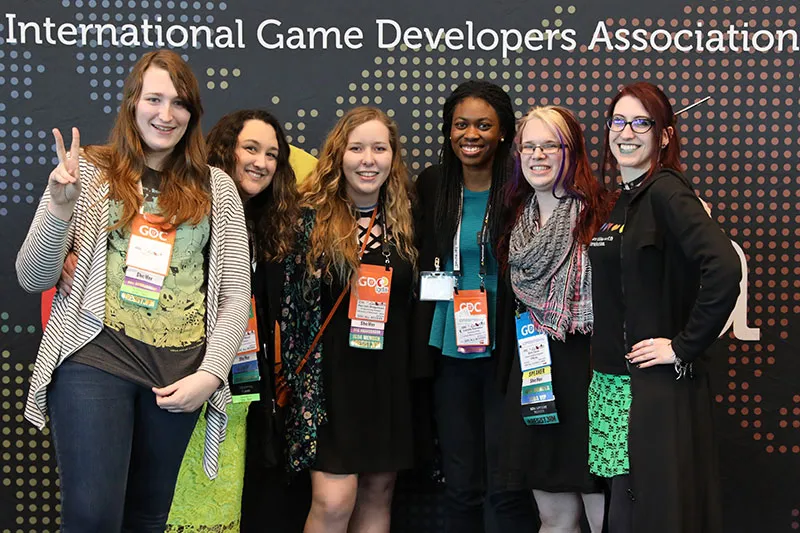

007 First Light headlines our newest issue about the most anticipated games of 2026 and beyond. Subscribe now!
Gaming is for everyone, and intelligent and creative women have always been an integral part of bringing the biggest and best games to life. From Sierra co-founder Roberta Williams, who pioneered the graphic adventure genre with series like King’s Quest, to Brenda Romero, who has spent nearly four decades as a programmer and designer in the game industry on franchises like Wizardry and Jagged Alliance, women have made extensive contributions to the industry. This has only continued with women taking more leadership roles, such as Jade Raymond going from executive producer on Ubisoft’s juggernaut Assassin’s Creed series to co-founding and becoming a GM at EA’s Motive Studios.
As the industry grows and more opportunities become available, women will continue to proliferate throughout video game development. But there’s still work to do. According to the ESA’s 2017 report, over 40 percent of gamers are women, but as the IGDA (International Game Developers Association) found the split of women in development is a little over 20 percent. “That’s just not enough,” says IGDA executive director Jen MacLean. “It doesn’t represent our customers. It doesn’t represent the potential talent that’s out there, and it really signals that as an industry we are closing ourselves to opportunity and possibility.”

Now more than ever, companies are aware of the importance of diversity and creating a more inclusive environment. Xbox head Phil Spencer devoted his entire 2018 D.I.C.E. keynote to this, calling for change and more resources put into those areas. Initiatives are also on the rise to help young girls and professional women embrace their passion and expand their presence. “There are positive stories to be told out there and we don’t tell them enough,” says Academy of Interactive Arts & Sciences president Meggan Scavio. “I don’t want to ignore the negative, but let’s broadcast the good stories that are happening out there.”
To learn more about these positive stories alongside the place of women in games, where it’s been and where it’s going, we reached out to influential developers, streamers, and leaders to share their experiences and goals.
 Jen MacLean IGDA
Jen MacLean IGDA Meggan Scavio Academy of Interactive Arts & Sciences
Meggan Scavio Academy of Interactive Arts & SciencesThese days accessing games is as easy as picking up your phone or tablet, with technology being omnipresent in children’s lives. Teaching kids about the electronic world that surrounds them needs to start at an earlier age, and society can no longer rely on preconceived notions of deprecated gender norms denoting that electronics are for boys. In a recent study conducted by Microsoft in partnership with KRC Research, only 27 percent of young women feel coding jobs are for them, while 52 percent feel powerful doing Science, Technology, Engineering and Math (STEM) work. Additionally, between now and 2030, the U.S. Bureau of Labor Statistics predicts the technology industry will be the fastest-growing, but the amount of women pursuing professions in that field will not match the growth. Many initiatives have been put in place to increase girls’ interest in STEM, letting them learn about these potential careers at an earlier age.
Girls Make Games is just one example of a thriving, successful program. What started off as a one-time summer camp has blossomed into a string of international camps, workshops, and game jams, all in the name of inspiring and supporting the next generation. Founder Laila Shabir was surprised to see how many girls felt like they “found their people” and could just be themselves at the camp. The whole experience was eye-opening, showcasing to Shabir that even at an early age, girls already had trouble feeling comfortable with their passion for games and finding others who shared their interests. “At the end of the camp, I gathered my team and said, ‘I think this is important. We have been given an opportunity to make a difference. It’s true we started out to make our own games, but if this is what the world needs right now. Let’s do this.’”
That was four years ago. In the time since, Shabir expanded the program to help support more than just young girls (the camp is open to ages eight through seventeen), but also women just kicking off their careers with the GMC Fellowship. This provides a chance for up-and-coming women to not only attend events such as the Game Developers Conference (GDC) and network with key figures at big-name companies, but also offers teaching positions at the Girls Make Games summer camps.
 Laila Shabir Girls Make Games
Laila Shabir Girls Make Games Rebecca Cohen-PalaciosBethesda, Pixelles
Rebecca Cohen-PalaciosBethesda, PixellesShabir, who won this year’s Entertainment Software Association visionary award for inspiring change, says most girls entering the summer program know very little about the games industry. “That was one of the first shocking things that we saw at the camps, that [the girls] didn’t even know the concept of a game studio or production house existed, and if you asked the girls what a game developer does, most of them would just respond ‘programming,’” Shabir explains. “They had no idea about music, art, sound effects, or writing – all these things that interest girls – could be a viable career for them.” All of these aspects of the industry are included in the summer program, all the way up to publishing and pitching their ideas.
Seeing young girls in camp has given Shabir insight into their struggles. Shabir, who grew up in the Middle East, says the confidence gap worries her most – something she didn’t expect in America. She used an example of a young girl asking a mentor about how to get her parents to accept her passion to make games. “It was such an interesting choice of words because she has to convince her parents to allow her to become a game developer,” Shabir says. “It’s not as simple as, ‘I like games. I want to make games. I’m going to do it.’ You have to convince your family, your peers, and you have to convince yourself, and there’s so much self-doubt at that age. That’s why programs like Girls Make Games are important, because when they go to camp, they feel so validated in who they are.”
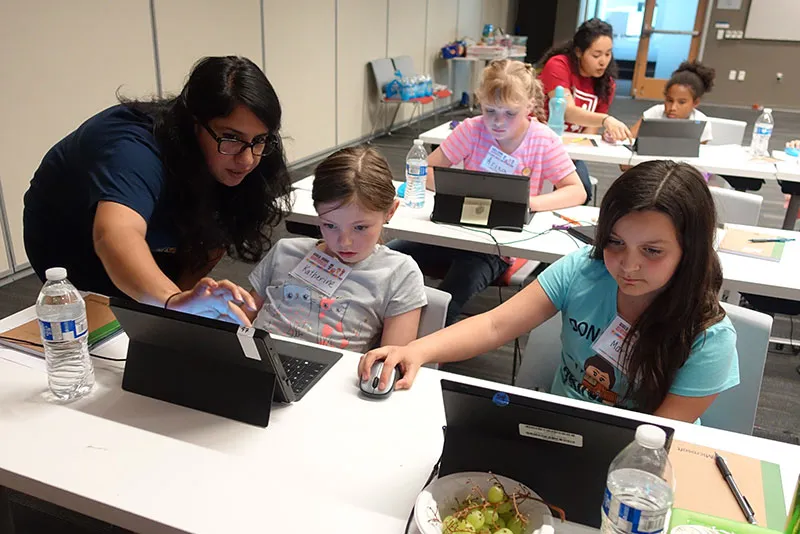
Shabir is hardly the only one giving young women a way to explore their interests in tech. The industry as a whole is working to help make the transition into video games much smoother with more programs and mentorships than ever before. The most telling thing about most of these organizations is many started as a one-off program, but then grew into something much larger after seeing the need for fostering untapped talent interested in the video game industry.
 Angie Smets Guerrilla Games
Angie Smets Guerrilla Games Siobhan Reddy Media Molecule
Siobhan Reddy Media MoleculeThat’s how it was for Pixelles, a non-profit organization located in Montreal that gives women the tools to make their first game. Pixelles has been going for five years, but when it first called on women for its Game Incubator program, the response was larger than ever expected, with 65 applications for a mere 10 spots. “That sent us a clear message of, ‘Hey, women want to make video games!’ recalls co-founder and director Rebecca Cohen-Palacios, who also works as a UI Artist at Ubisoft Bethesda Game Studios. “Over the course of the incubator, after speaking with participants, [we discovered] there was also a need for a space for women-in-games.”
This led to the organization expanding to create additional programs focusing on writing and mentorship, alongside a GDC scholarship program. Pixelles also hosts free monthly workshops and special events with the activities open to anyone of any gender.
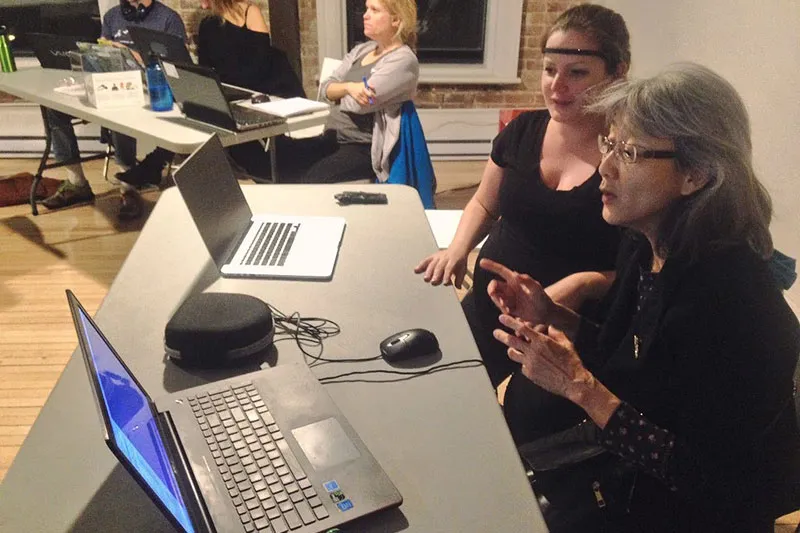
With misconceptions about the field and hobby all around (see Changing Perceptions sidebar), many women have taken up the cause of reaching our younger generation to educate them on the opportunities that exist in the video game space. Guerrilla Games’ executive producer Angie Smets has been with the company for the past 17 years and, because of the studio’s diverse and friendly environment, didn’t realize the trouble women were experiencing around the world. “I always felt like my gender didn’t matter,” she says. “I could have been a boy and I think I would have the same career path.”
 Shannon Studstill Sony Santa Monica
Shannon Studstill Sony Santa Monica Shannon Loftis Microsoft
Shannon Loftis MicrosoftHowever, in recent years after chatting with other female senior developers and seeing an increase in hostility, she realized there was more she could do. Now she spends her time going to schools in the Netherlands (the location of Guerrilla’s studio) to discuss the process and give them a better idea of the career opportunities, especially in the triple-A space. “Eighty percent of these students would often be male, but they would also see a woman who works in games,” she says. “I think it also instills the image of it being normal that women make games.” To Smets, one of the most exciting things is seeing the percentage of women at the schools who want to go into the field increase, saying it’s getting closer to one-third of them.
Similarly, U.K.-based Media Molecule coordinates with classrooms in the area for kids to see the behind-the-scenes process of a game being made. “I am very happy to say yes to school groups all of the time,” says co-founder and studio director Siobhan Reddy. She’s made this visit more interdisciplinary, so students see creating a game goes beyond just programming and into areas such as composing. “We’ve been talking about how to go younger because the rhyme is, ‘year eight is too late,’” Reddy says. “By then, young women have already been put off, so we have to get in earlier. We need to show at the primary school age what’s possible.”
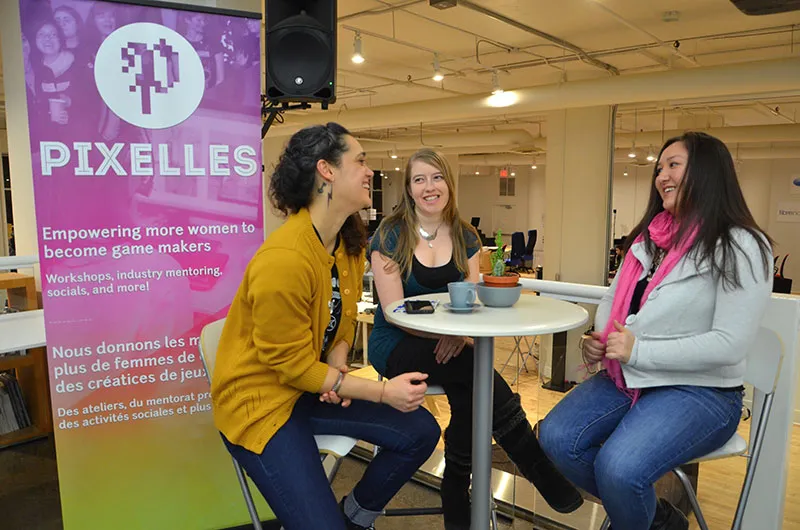
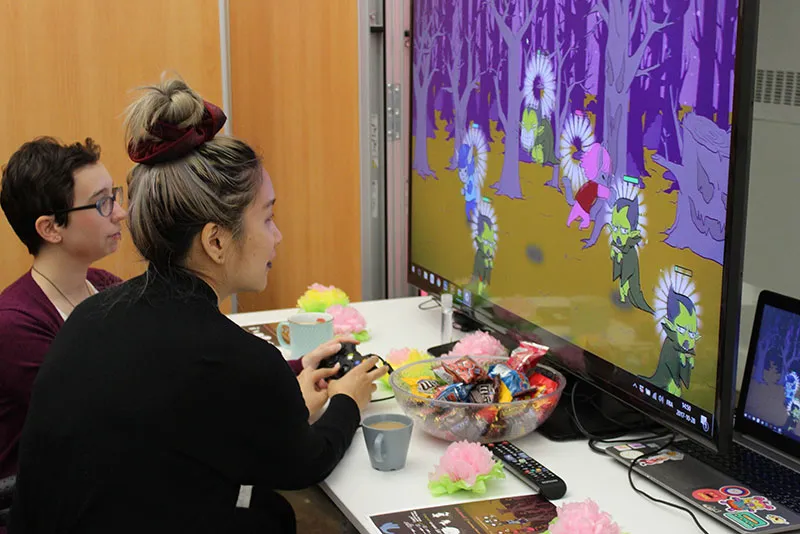
Shannon Studstill, head of Santa Monica Studios and VP of product development, thinks while we’re seeing improvement, we still have a lot of work to do. “The opportunities that exist in the industry... I don’t think the awareness is as good as it could be,” Studstill says. “There’s a plethora of opportunities in gaming, it’s an exciting environment, and it’s creative, and it’s not an all-boys’ club experience. How well are we really getting that out there, so women consider it as a career opportunity?”
Studstill makes a good point, and it’s why women are trying to break that stereotype by showing people first-hand their role in the industry.
A common issue facing the gaming industry is the visibility of women, but it’s not like women aren’t already in key development or leadership roles. The women interviewed in this piece are proof, but we still don’t have many recognizable female auteurs like Todd Howard or Hideo Kojima. Getting more women to be recognized for their roles on stage is one step to fixing this.
“I think it’s just a matter of making sure we are continually getting the women of the industry out there, making it known that we’re available to help people and [answer] questions,” says general manager of Microsoft Studios Publishing Shannon Loftis. Like Loftis, a lot of women in the industry have taken it as a call to action to be more present and available to speak at conferences. Why? Because providing role models is important. Girls need to see women in these roles to be able to envision themselves in similar positions. Girls Make Games brings in women developers to speak at the camp for this very reason; Shabir noted how uplifting it is for the young girls to see, saying it “makes the biggest impact more than any technological knowledge that we could impart.”
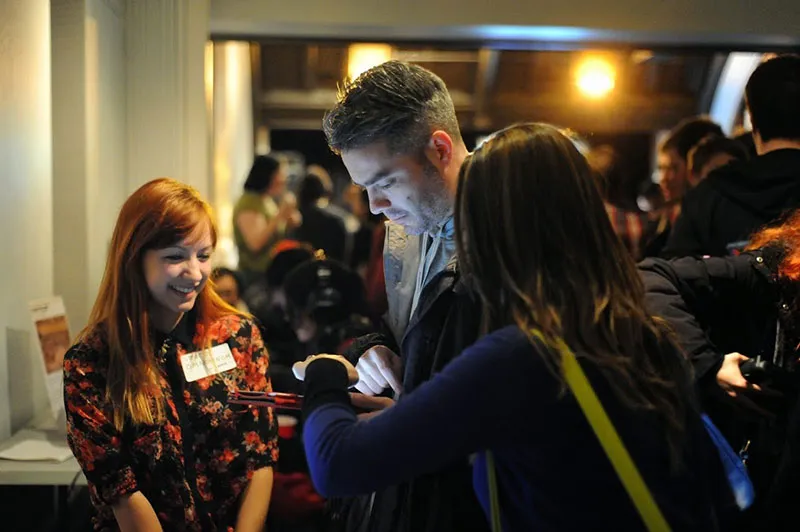
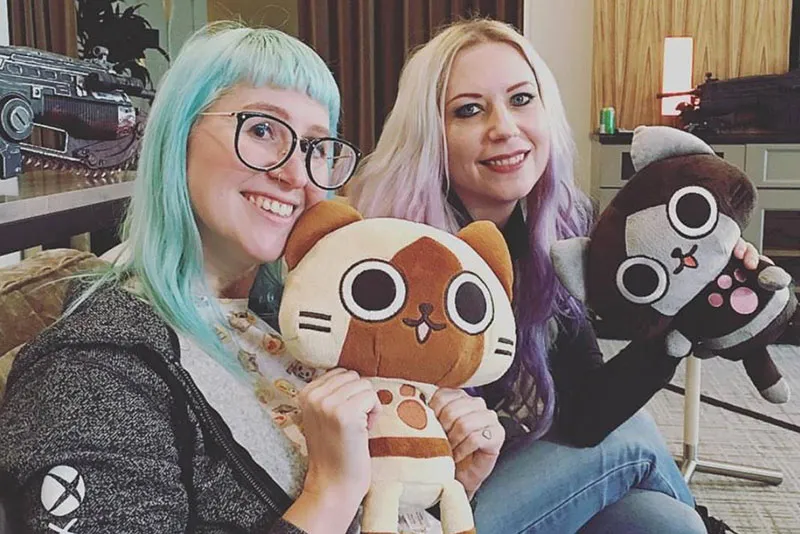
Almost every woman in development I spoke to discussed becoming more aware of this, striving to put themselves into the spotlight more. “It is important for female game developers to be vocal about their roles and careers,” says Insomniac Games art director Jacinda Chew. “We can participate in interviews, write papers, and speak at schools and conferences to name a few examples. At the same time, women need to be offered more of these opportunities as well, so it’s critical to actively recruit a diverse pool of subject matter experts when organizing events or news stories.”
 Jacinda Chew Insomniac Games
Jacinda Chew Insomniac Games Robin Hunicke Funomena
Robin Hunicke FunomenaReddy had always been around women in leadership roles and worked on diverse teams, so she hadn’t really thought of the power she had by speaking at more events. “It took to the point of me really being pushed out into the spotlight that made me be reflective that I had kind of avoided being visible,” Reddy says. “I hadn’t realized how important it was to be visible and what kind of impact that would have.” Reddy says it’s led to more diverse people reaching out to visit the studio and realize the opportunities available.
With more women taking the stage, a pre-GDC event called Amplifying New Voices formed to help prepare them for the spotlight. ANV was started by a multitude of key women in leadership positions, such as Funomena’s Robin Hunicke, Double Fine’s Caryl Shaw, and Guerrilla Games’ Angie Smets. “This trains the next generation of speakers,” says Scavio, who also helped form the initiative. “It gives them the confidence to go out and speak with authority when they’re on stage,” Hunicke adds. “A lot of the labor that we ask young women, women of color, and queer folks to do right now like being on panels, we’re asking them to do it without preparation.” Right now, ANV is currently fundraising to expand the program to include paid mentors in the coming year.
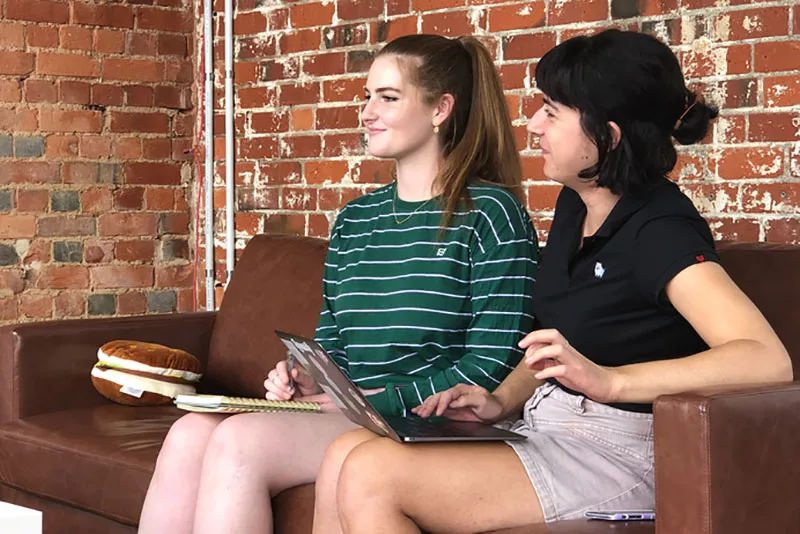
Plenty of other initiatives also support visibility, with two recent ones making waves. GirlsBehindTheGames was created by team members at Runaway, a studio that creates mobile and VR games. Runaway has a good ratio of men to women staff, so team members were shocked when they started breaking down statistics and realized that’s not the case in most studios. “We all discussed as a team that we want to try and make a difference,” says Runaway games marketer Caroline Carter.
While the studio is based in New Zealand, it wanted these conversations happening around the world, so the team took to Twitter to create GirlsBehindTheGames, and women used the eponymous hashtag to promote their work, offer mentorship, and answer questions. The discussion caught fire, with female developers from popular studios such as Telltale, Riot Games, BioWare, and Ubisoft chiming in. Even New Zealand’s prime minister Jacinda Ardern created a video to support the cause. Since then, Runaway has let women in the industry take over the -GirlsBehindTheGames - Twitter account, allowing them to use the account for a day to answer questions and explain the work they do.
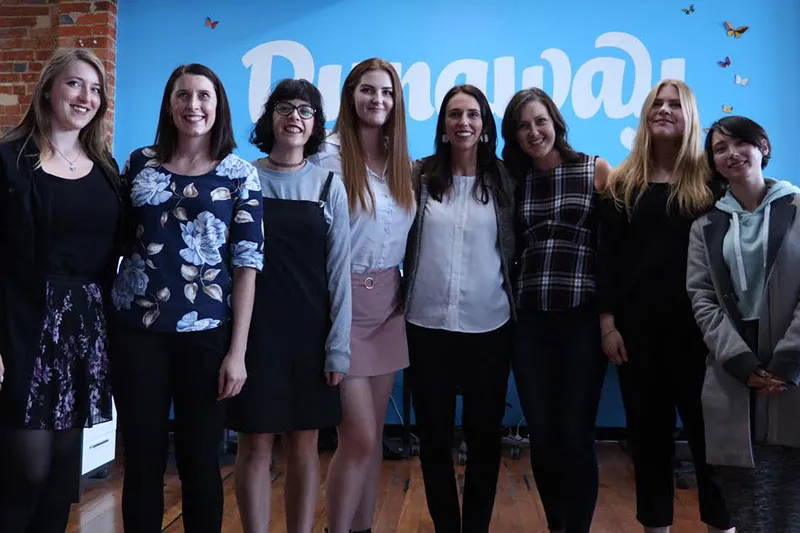
Similarly, Facebook’s Women in Gaming, launched this past February, features interviews with women in various roles in the industry, covering everything from the media to development. Right now, they have 20 stories, but their goal is to get up to 100 by the end of the year. They started the hashtag #SheTalksGames to bring awareness to the career opportunities available in the industry and also the diversity of the people. “Our mission was to really champion diversity in the games industry, encouraging more women into the industry and leadership positions, and to really partner with others and inspire change,” says Facebook head of global marketing and gaming Aoife Brodigan.
So far, Brodigan has been impressed with the support this initiative has received. “We’ve been really overwhelmed by the response, it’s been incredible to see the companies and people really stepping forward, not just women, but men also wanting to support and be involved,” she says. “[Men] can be true allies to women in the industry.”
It would be disingenuous to bypass the tougher conversations that need to happen about women in the industry and their role in tech moving forward. As more women enter the workplace and advance their careers, companies must strive for better solutions to festering problems. In addition to a lack of women in leadership positions, retention rates are low for women in tech. Numerous factors contribute to this, from women not seeing room for advancement to the workplace not being as female-friendly as it could be. Sadly, there is no easy solution.
“We’re making progress,” MacLean says, who is coming up on her 26th year in the industry. “We’re tracking diversity numbers, which we didn’t use to do before. We’re having open conversations about diversity and inclusivity. We talk a lot about why it matters, and we have a much better appreciation of how important women are as an audience of game players. But at the same time, the progress we’re making is not fast enough.” MacLean spoke to a recent U.K. gender pay gap report as an example. “Any industry where women routinely make 80 percent or less of what a man makes is not okay,” she says.
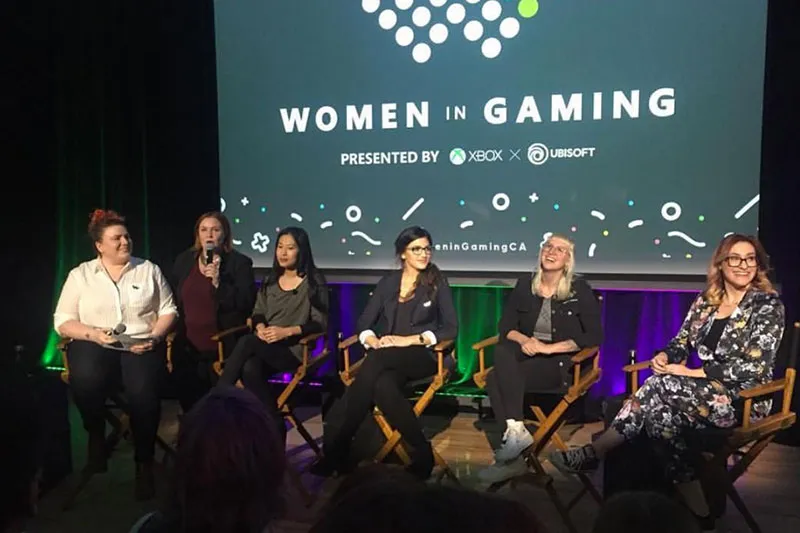
Thankfully, action is afoot. Many women spoke to a variety of ways to improve the current state of things. “We have so many challenges and so many things going against us,” Shabir says. “The workplace was designed by men for men for the longest time and now we’re coming in and questioning the status quo and changing things. Not enough is changing fast enough and people are just sick of it. Women in the workplace need to step up and share what would make the workplace better.”
Microsoft’s Women in Gaming initiative, which has been around for 18 years, has expanded its role in recent years to tackle the problems outlined in this feature. Nicole Fawcette, an Xbox senior brand manager, stresses that anyone can come to these events from anywhere in the industry, even direct competitors. “We need to support one another, not compete against each other,” she says. They hope to attract more women and young girls to the industry, holding events such as The Women in Gaming Rally at GDC and working with organizations like Girls Make Games and Girls Who Code. To help with retention internally, they offer leadership training and networking events.
 Nicole Fawcette Microsoft
Nicole Fawcette Microsoft Tanya X. Short Kitfox Games, Pixelles
Tanya X. Short Kitfox Games, PixellesThe industry has seen some dark times with a few unpleasant events and issues bubbling to the surface, from sexism to hate mobs, but there has also been a push for the industry to change. Loftis has noticed the clouds beginning to clear. “I’ve seen really interesting things come out of [those trying times],” she says. “There are more networks, more conversations, and more groups that are explicitly focused on diversity, not just gender diversity, but diversity all up. It feels now, while there are still problems, no question, the focus on the value of diverse voices in the industry is openly discussed and acted upon, which I don’t think would be possible if we didn’t have a terrible couple of years.”
Cohen-Palcios agrees we need to keep this conversation going for improvement to emerge. “By continuing to have these conversations and shifting games culture, we can move even faster, especially in collaboration with local organizations that have the power to directly and effectively impact communities,” she says. “We shouldn’t snub the small changes or tiny grassroots initiatives either, because even those can have life-changing ripple effects.”
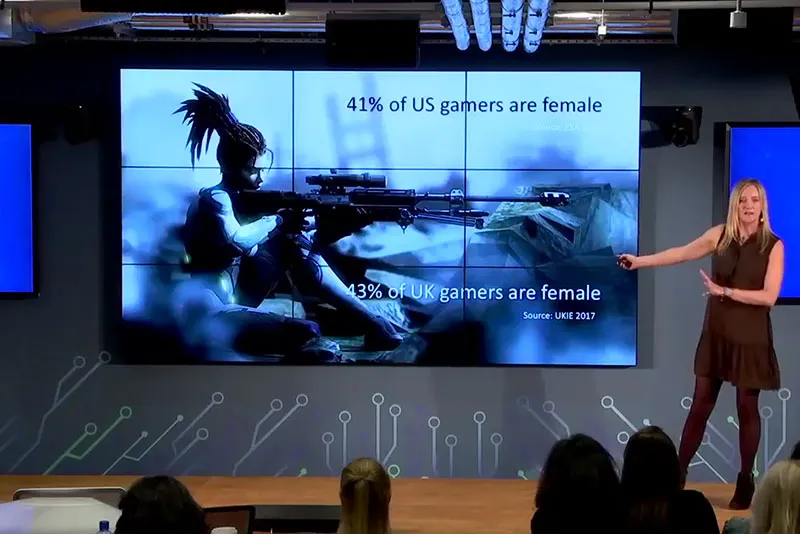
It may not seem like much, but even just being more mindful of these issues is key to solving them. “It’s easy to get discouraged when we see such a big problem, but we each have the power to positively influence the people around us,” says Pixelles co-founder and director Tanya X. Short. “Signal boost the women doing good work. Have gentle, awkward conversations with the friends and acquaintances about problematic words and actions they might be taking. Take responsibility for the impact you have on the world, and just keep working to make it a little bit better, day by day.”
This article appears in the June 2018 issue of Game Informer.
Note: Comments are disabled for this feature.

Explore your favorite games in premium print format, delivered to your door.